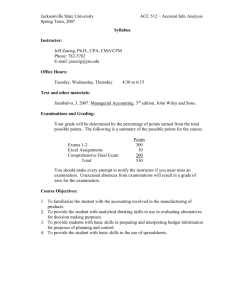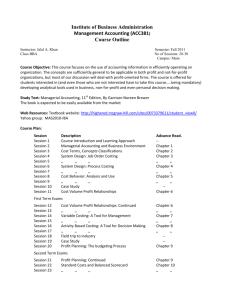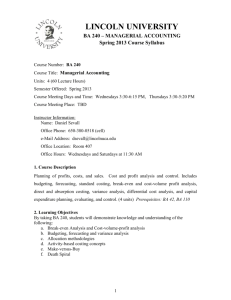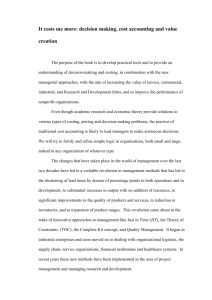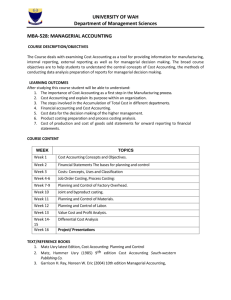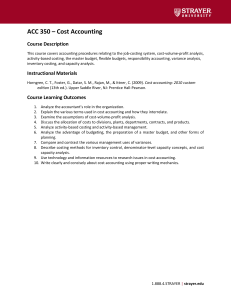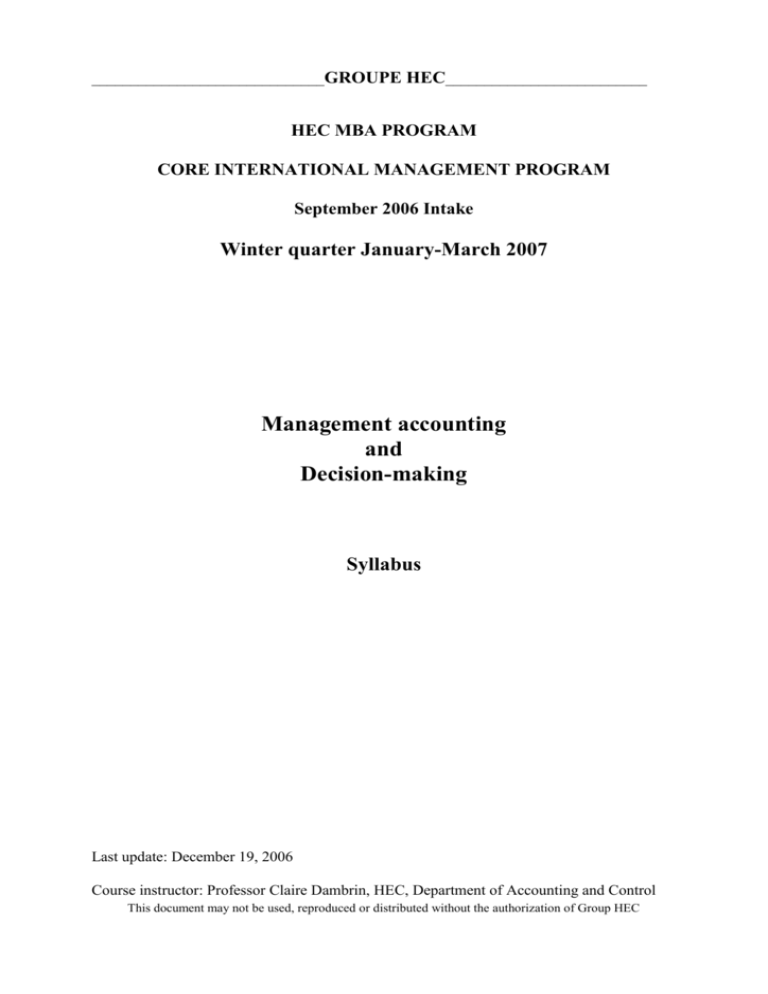
______________________________GROUPE HEC__________________________
HEC MBA PROGRAM
CORE INTERNATIONAL MANAGEMENT PROGRAM
September 2006 Intake
Winter quarter January-March 2007
Management accounting
and
Decision-making
Syllabus
Last update: December 19, 2006
Course instructor: Professor Claire Dambrin, HEC, Department of Accounting and Control
This document may not be used, reproduced or distributed without the authorization of Group HEC
Management accounting & decision-making
Syllabus
Winter quarter January-March 2007
Instructor: Dr. Claire DAMBRIN
Office Hours: by appointment
Office Location: W2 building, room 43
Office Phone: 01 39 67 72 94
Email: dambrin@hec.fr
1- Course description
Management accounting is a field in transition, moving from a procedural focus to a strategic
focus on the use of managerial accounting information to facilitate the managerial decision
for the success of the enterprise - for manufacturing, service, and not-for-profit organizations.
A principal motivation for the changes in management accounting is the increased global and
domestic competition, the rapid change of manufacturing and information technology, a
renewed focus on the customer satisfaction, a constant need for cost reductions and quality
control.
Management accountants can no longer be a reporter of financial information. They should
turn themselves into a business partner - developing and presenting information that is critical
for the decision-makers.
The objective of the course is not to turn you into professional accountants, because most
MBA students will become users of management accounting information for decisionmaking, rather than preparers of this information. The primary objective is to enable you to
make effective use of management accounting data within your own organization or
effective practice. A second objective is to develop the analytical skills necessary to
reduce complex business problems into simple models that assist in the decision-making
process.
We shall see how accounting information can be useful in making managerial decisions in a
global business environment. This course takes a holistic approach to accounting rather than
focusing exclusively on accounting methodology per se. We shall combine the study of
traditional concepts and techniques with that of the most recent advances in management
accounting.
Prerequisites
This is not essentially a mathematically sophisticated course. The course requires some ability
to diagnose and model complex business issues, and is based on analytical, rather than
mathematical approaches.
The course's point of view also largely differs from the financial accounting perspective, as it
is based on managerial thinking rather than on a purely accounting viewpoint. Some
background in operations, marketing, strategy, organizational behavior, management
information systems and statistics would help. We shall insist on the integrative nature of the
course, as decisions cannot be examined independently from their business context.
Management accounting and Decision-making Syllabus - p. 1
2- Course objectives
The objective of the course is to reinforce the students' practical and theoretical understanding
of some key "tools" and thinking patterns of management accounting for decision making. At
the end of the course, managers-in-the-making should be able to:
know how to use key instruments such as cost behavior, costing techniques, critical
cost concepts in decision making;
understand how costs and value are created;
make informed decisions based on an economic point of view, but also as to fulfill the
strategic objectives of the firm;
be able to identify the changes needed in a managerial information system to meet the
specific decision-making goals of their organizational unit.
3- Course themes
The course has been structured to allow for gradual progressions from the simpler to the more
complex. It consists of an introduction (1 classroom session) and the following techniques
and topics:
Breakeven analysis
Pricing decisions
Costing systems
Job-costing and process-costing
Cost allocation systems
Joint-product and by-product costing
Activity-based costing
Customer profitability analysis
Process improvements, Activity-based management
Kaizen and Target costing
Capital investment decisions
4- Course material
The required text for the regular class meetings is:
Horngren, Bhimani, Datar & Foster, Management and cost accounting (3rd edition),
Pearson Prentice Hall, 2005.
This textbook is referred to as HB. Lectures in class are the core of what you need to know,
and you may find it useful to do further reading in HB. The class schedule refers to the
relevant chapters of HB and most exercises are taken from this book as well.
A course pack will also be available containing cases and additional facultative readings.
For your own information, you may also find it useful to refer to the following textbooks:
- Atkinson, Kaplan, Young, Management Accounting (4th edition), Pearson Prentice
Hall, 2004.
- Shank, Cases in cost management: a strategic emphasis, Southwestern, 2001;
- Groot & Lukka, Cases in management accounting: current practices in European
companies, Prentice Hall, 2000.
Management accounting and Decision-making Syllabus - p. 2
Additional resources will be made available online at: http://studies.hec.fr/web/dambrin/ (the
login and password will also be provided in due time).
5- Teaching methods
The course uses lectures with concept-application exercises and/or problem-solving exercises
(tool-based, simplified situations) and case studies (decision-based, more complex situations).
Key elements for problem-solving exercises and cases will be provided to the students.
MBA students are also expected to read the course material beforehand and prepare some
analysis of the cases for each lesson.
An electronic version of powerpoint slides used in class will also be available on the website
the night before class. Technological inconveniences may lead to send the documents by email to all students instead.
6-
Students grading
You have to reach a minimum of 55 points in total (all marks included) to pass the course.
The final grading will contain the items and weight as follows:
2 graded team assignments (written assignment or in-class PPT 40 points
oral presentation)
Class participation
10 points
Final 2hrs individual exam
50 points
Total available
100 points
Final grades are based partly on two team assignments (in class Powerpoint oral presentation
or written assignment); class participation; and on a final exam. Note that a 40% mark
(minimum 20 points) in the final exam is a requirement to pass the course.
If you encounter and are aware of methodological difficulties, you should not hesitate to
contact your instructor by email and take an appointment.
Group assignments (40 points)
There will be two graded group assignments during the course.
The group assignment can either be an oral presentation of the group on a case (20 minutes
presentation, followed by class discussion) or a written report on a case. Each group
assignment will account for 20 points. During the first session, Students will decide their
team members. Teams should not exceed 4 students per group.
You may choose to present and hand out these assignments at the most convenient time for
your group, and according to the topics that you would like to add value to. You may perfectly
hand out two reports, or do one class presentation and hand out one report. However, as
in-class presentations must be limited to one per case study in the syllabus, you must let me
know asap if you wish to give an oral presentation. A schedule will be organized at the
beginning of the course on a first come, first served basis, and no later than January 22,
2007.
When presenting a case analysis, any member of the group must be able to present and
discuss the case orally in class (presence and participation of all members are
Management accounting and Decision-making Syllabus - p. 3
essential). Please provide me with your power point presentation at the beginning of
the presentation.
Please be ready for case reports latest at the beginning of the class when the case will
be discussed. Note that the written case analysis report shall not exceed 5 pages (10
pages including appendices). Please provide me with one paper version of your group
report.
Note that group assignments involve both technical and judgmental aspects. Consequently,
the grading of these cases and project has both objective and subjective components.
Group work supposes active discussion within the group of all the concepts, questions
and suggested solutions, by all the members of the group together . Any member of the
group must be able to relate at any time in class of the group’s discussions and conclusions.
Class preparation & participation (10 points)
Please keep in mind that although I will not check attendance in a systematic way, attending
the MBA courses is a requirement. Managing your time and calendar is your responsibility.
Assessment on class participation will take place based on a variety of criterias including
analytical and problem-solving skills, communication skills, and behavioral and ethical
issues. As preparation is an essential ingredient to create a stimulating class environment,
the evaluation will also take into account students’ contribution in class and their ability to
express their views about the problems or cases to be prepared. The instructor expects
students to behave in an appropriate and ethical manner and to show respect to her and
classmates.
I expect you to prepare all homework assignments – problems and cases – and always be
prepared for class. Attending a class that you have not prepared not only damages your own
learning, but also cuts on the stimulating class environment. I expect that at the beginning of
any class you can provide a picture of the main case issues in a way that enhances the
discussion and collective learning.
Active individual participation all along the class sessions also stimulates active learning
and help the lessons to sink in deeper. Please use a name card in my class to help me know
you individually in the best delays.
Class participation is expected, nevertheless, you are also expected to listen to the others and
build on previous observations in a constructive manner. Poor grades are assigned to students
who rarely contribute or monopolize the time with irrelevant comments. Furthermore, given
the number of students and time constraints, there will be moments when I will need to
allocate speaking time accordingly and keep to the context of the core themes of the session.
You may send me by e-mail as many home assignments that you have prepared as you wish.
Please try and restrain your comments and suggestions to two A4 pages. I will do my best to
return some written comments within two week days. This may help you with evaluating your
own progress. However, I will not grade these short papers and I will not take them into
account in your participation grade. This is only for your support.
Management accounting and Decision-making Syllabus - p. 4
Exam policy (50 points)
Please note that a 40% mark (minimum of 20 points) is a requirement at the final individual
exam to pass the course.
It is an open-book exam. All paper sources are authorized, but no electronic devices
(computer, phone, etc.).
The date for the Management Accounting & Decision-making exam has been set:
Tuesday, March 20, 2006, 1:00-3:00PM
Only in the case of an emergency with written proof (such as a medical certificate) may an
exam be missed. Job interviews are not accepted as a reason for missing an exam.
Exams will be graded within three weeks. Should you have any questions regarding your
grades, please request an appointment with your instructor.
7- Course Content
S
Date and
schedule
Program
Recommended Facultative readings
readings
HB chapters 1,2
1 Thursday, Introduction to cost
January
management and
18, 2007 management accounting
Cases and
exercises to
prepare
“The Case for
Management
Accounting”, Strategic
Finance, Oct.2003 *
“Roles and Practices in
Management
Accounting Today”,
Strategic Finance, July
2003 *
“The Cost Accountant is
dead, long live the
Business Process
Analyst”, Strategic
Finance, Dec.2005 *
“IMAC committee
proposes guidance for
achieving ethical
behaviour”, Strategic
Finance, Strategic
Finance, Dec.2006 *
2 Thursday,
January
25, 2007
3 Friday,
January
26, 2007
4 Monday,
January
29, 2007
Refreshment CostVolume-Profit,
Cost behaviour
Job costing systems and
process costing systems
HB 8 (pp.232249),
HB 9
Case study:
Bill French
Accountant*
HB 3 (pp.61-72)
HB 4 (pp.92-108)
HB Problems
4-19 and 4-20
Cost allocation and
allocating joint costs
HB 5,
HB 6
HB Problem
6-22
(process further
or sell byproducts)
Case study :
Unitron *
Management accounting and Decision-making Syllabus - p. 5
HB 10 (except
5 Thursday, Relevant costs in
pp.316-318)
February business decisions:
1, 2007
- fixed/variable costs;
- product-mix decisions
under capacity
constraints
6 Thursday, Activity-Based Costing HB 11
February
8, 2007
7 Thursday, ABC/ABM (costs of
February ABC, customer
15, 2007 profitability analysis)
HB 10, (pp.316318), HB 12
(pp.373-380,
pp.393-400)
8 Thursday, Target Costing (market
March 8, based view, resource2007
based view)
HB 12
pp.380-387 &
pp.390-393
9 Tuesday,
March
13, 2007
HB 13
Capital investment
decisions
1 Thursday, Synthesis
0 March
15, 2007
Shank, Govindarajan,
College (1992),
“Strategic Cost
Management: the Value
Chain Perspective”,
Journal of Management
Accounting Research,
vol.4 *
“What ERP can offer
ABC”, Strategic
Finance, Aug.2003 *
“How to create an
Activity Management
Program that lasts”,
Strategic Finance,
Feb.2004 *
“Using CRM to increase
profits”, Strategic
Finance, March 2004 *
Monden, Hamada
(1991), “Target Costing
and Kaizen Costing in
Japanese Automobile
Companies”, Journal of
Management
Accounting Research,
vol.3, Fall *
“A Holistic Approach to
Venture Capital
Investment Decisions”,
Strategic Finance,
Feb.2005 *
HB Problem
10-13
Case study:
Bridgeton*
HB Problem
11-13 (product
cost crosssubsidiation)
Case study:
Destin Brass
Products*
Case study:
Sloan Styles
Inc. *
HB problem
12-12
Case study:
Mercedes
Benz: All
Activity
Vehicles*
HB problem
13-21
“Strategic Decisions and
Cash Flow”, Strategic
Finance, July 2003 *
Cooper (1996),
Case study:
“Costing techniques to
Dublin Shirt
Company *
support corporate
strategy”, Management
Accounting Research,
vol.7 *
* Indicates this is a case, exercise or reading that is in the course pack.
Bold indicates one of the possible group assignments.
Management accounting and Decision-making Syllabus - p. 6


